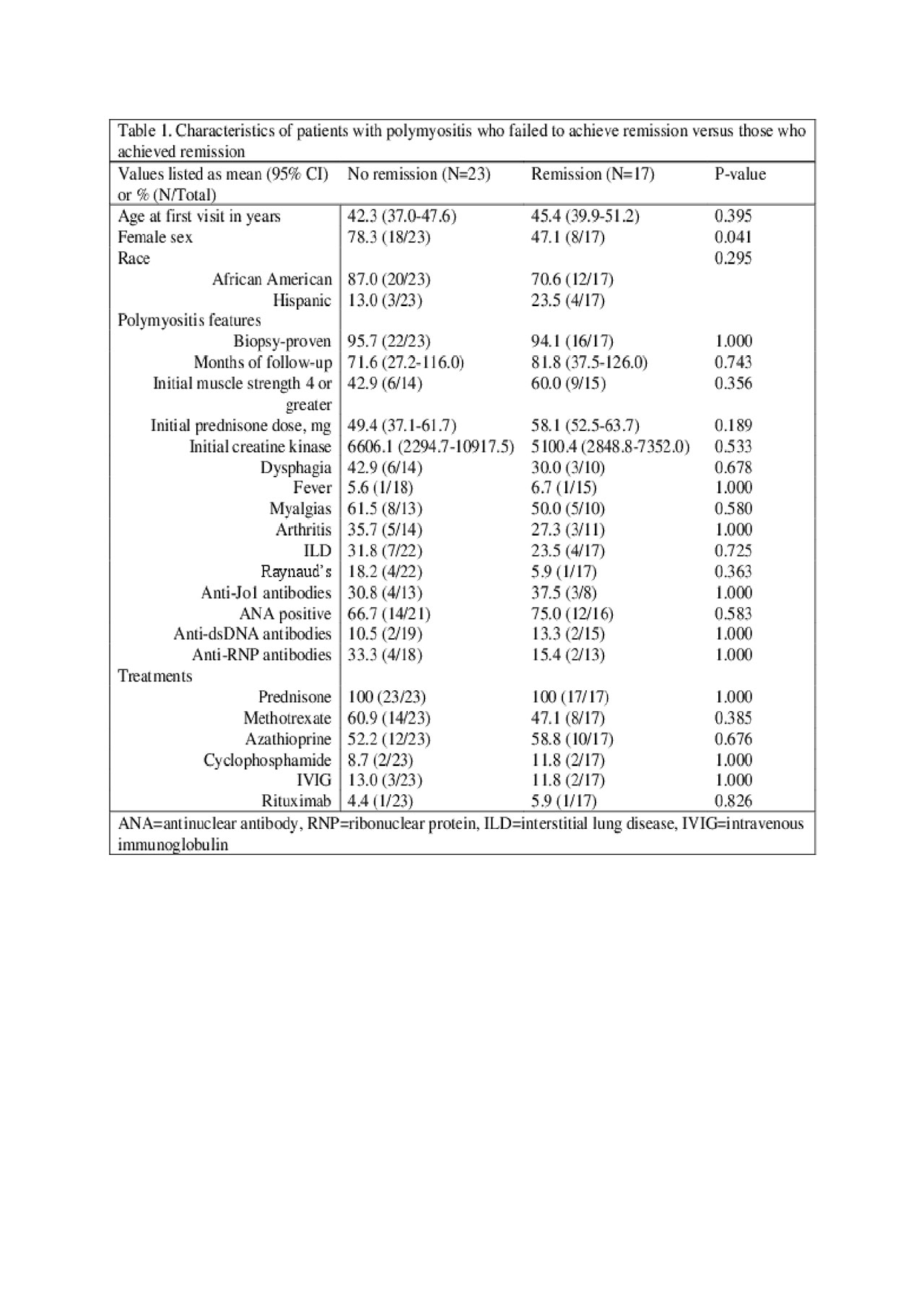Session Information
Session Type: Poster Session (Monday)
Session Time: 9:00AM-11:00AM
Background/Purpose:
Adults with polymyositis demonstrate wide variability in responses to treatment, and the risk factors for failure to achieve remission in polymyositis are largely unknown. The aim of our study was to identify risk factors for failure to achieve remission in adult polymyositis.
Methods: In this retrospective chart review, we collected data on patients with a diagnosis of polymyositis who were seen in the rheumatology clinic at John H. Stroger Hospital of Cook County (Illinois, USA) between 2006 and 2011. Patients were included if they had “definite” or “probable” polymyositis based on the 1975 Bohan and Peter criteria. Remission was defined as normal muscle strength and creatinine kinase (CK) level < 200 mg/dL. Baseline characteristics were compared between those who achieved remission at any point during follow-up and those who did not. Chi square tests or Fisher’s exact test were used to compare categorical variables and two-tailed Student’s t-tests were used to compare continuous variables. Univariate logistic regression analysis was used to calculate unadjusted odds ratios (ORs) for the outcome of failure to achieve remission. A multivariable logistic regression was conducted using age, female sex, race, follow-up time, and clinical variables with a univariate screen p-value < 0.2 as predictors. A p-value of 0.05 was set at the threshold for statistical significance.
Results: 40 patients, 95% of whom had biopsy-proven polymyositis, were included in this study. The mean age of the study population was 43.7 years, and 65% of the patients were women. African Americans and Hispanics constituted 80% and 18% of our study population, respectively. Mean duration of follow-up (in months) was 71.6 and 81.8 in those who failed to achieve remission and those who achieved remission respectively. 78.3% of those who failed to achieve remission were women, versus 47.1% of those who achieved remission (p=0.041). Women were less likely to achieve remission compared to men (OR 5.39 [95% CI 1.18-24.57]; p=0.019), even after adjusting for age, race and months of follow-up. Treatments were similar between those who achieved remission and those who did not.
Conclusion: In this small retrospective cohort of African American and Hispanic patients with polymyositis, female sex was a risk factor for failure to achieve remission. Because treatments were similar between groups, we hypothesize that less aggressive treatment of polymyositis disease activity in women may be the cause of this sex disparity.
To cite this abstract in AMA style:
Lingamaneni P, Richardson C, Kambhatla S, Manadan A. Female Sex Is a Risk Factor for Failure to Achieve Remission in Polymyositis [abstract]. Arthritis Rheumatol. 2019; 71 (suppl 10). https://acrabstracts.org/abstract/female-sex-is-a-risk-factor-for-failure-to-achieve-remission-in-polymyositis/. Accessed .« Back to 2019 ACR/ARP Annual Meeting
ACR Meeting Abstracts - https://acrabstracts.org/abstract/female-sex-is-a-risk-factor-for-failure-to-achieve-remission-in-polymyositis/


